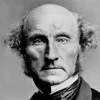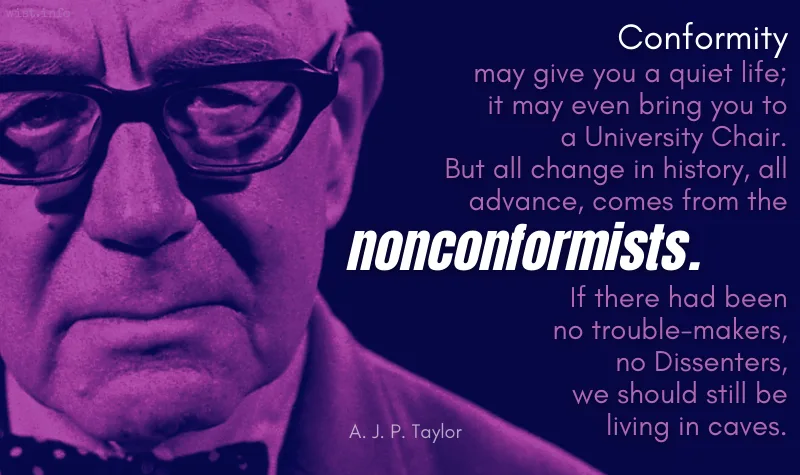It is a stifling, stultifying world in which to live. It is a world in which every word and every thought is censored. In England it is hard even to imagine such an atmosphere. Everyone is free in England; we sell our souls in public and buy them back in private, among our friends. But even friendship can hardly exist when every white man is a cog in the wheels of despotism. Free speech is unthinkable. All other kinds of freedom are permitted. You are free to be a drunkard, an idler, a coward, a backbiter, a fornicator; but you are not free to think for yourself. Your opinion on every subject of any conceivable importance is dictated for you by the pukka sahibs’ code.
George Orwell (1903-1950) English writer [pseud. of Eric Arthur Blair]
Burmese Days, ch. 5 (1934)
(Source)
Of the life of the Englishman John Flory, the protagonist, in Burma, part of the 1920s British Raj. Orwell's first novel, it was based on his own experiences as a police officer in that part of the word. The pukka sahibs were the "excellent fellows," i.e., the European (white) colonialists of the region.
Quotations about:
conformity
Note not all quotations have been tagged, so Search may find additional quotes on this topic.
The Establishment is enlightened, tolerant, even well-meaning. It has never been exclusive, rather drawing in recruits from outside, as soon as they are ready to conform to its standards and become respectable. There is nothing more agreeable in this life than to make peace with the Establishment — and nothing more corrupting.
A. J. P. Taylor (1906-1990) British historian, journalist, broadcaster [Alan John Percivale Taylor]
“William Cobbett,” The New Statesman (1953-08-29)
(Source)
Taylor is often credited with coining the term "the Establishment" (what Cobbett called "the Thing"). The article, reviewing a biography of Cobbett, was collected in Taylor's Englishmen and Others (1956).
FASHION, n. A deity whom the wise ridicule, yet the discreet obey.
Ambrose Bierce (1842-1914?) American writer and journalist
“Fashion,” The Cynic’s Word Book (1906)
(Source)
In The Devil's Dictionary (1911), it is defined as: "FASHION, n. A despot whom the wise ridicule and obey."
Originally published in the "Devil's Dictionary" column in the San Francisco Wasp (1884-06-28).
The great misfortune, the root of all the evil to come, was the loss of faith in the value of personal opinions. People imagined that it was out of date to follow their own moral sense, that they must all sing the same tune in chorus, and live by other people’s notions, the notions which were being crammed down everybody’s throat.
Boris Pasternak (1890-1960) Russian poet, novelist, and literary translator
Doctor Zhivago [До́ктор Жива́го], Part 2, ch. 13 “Opposite the House of Caryatids,” sec. 14 [Yury] (1955) [tr. Hayward & Harari (1958), UK ed.]
(Source)
Alternate translations:The main misfortune, the root of all evil to come, was loss of the confidence in the value of one's own opinion. People imagined that it was out of date of follow their own moral sense, that they must all sing in chorus, and live by other people's notions, notions that were crammed down everybody's throat.
[tr. Hayward & Harari (1958), US ed.]The main trouble, the root of the future evil, was loss of faith in the value of one’s own opinion. People imagined that the time when they followed the urgings of their moral sense was gone, that now they had to sing to the general tune and live by foreign notions imposed on everyone.
[tr. Pevear & Volokhonsky (2010)]
However that may be, it is always disastrous when governments set to work to uphold opinions for their utility rather than for their truth. As soon as this is done it becomes necessary to have a censorship to suppress adverse arguments, and it is thought wise to discourage thinking among the young for fear of encouraging “dangerous thoughts.” When such mal-practices are employed against religion as they are in Soviet Russia, the theologians can see that they are bad, but they are still bad when employed in defence of what the theologians think good. Freedom of thought and the habit of giving weight to evidence are matters of far greater moral import than the belief in this or that theological dogma. On all these grounds it cannot be maintained that theological beliefs should be upheld for their usefulness without regard to their truth.
Bertrand Russell (1872-1970) English mathematician and philosopher
“Is There a God?” (1952)
(Source)
Essay commissioned by Illustrated magazine in 1952, but never published there. First publication in Russell, Last Philosophical Testament, 1943-68 (1997) [ed. Slater/Köllner].
I was brought up to believe that there is no virtue in conforming meekly to the dominant opinion of the moment. I was encouraged to believe that simple conformity results in stagnation for a society, and that American progress has been largely owing to the opportunity for experimentation, the leeway given initiative, and to a gusto and a freedom for chewing over odd ideas. I was taught that the American’s right to be a free individual, not at the mercy of the state, was hard-won and that its price was eternal vigilance, and that I too would have to be vigilant. I was made to feel that it would be a disgrace to me, as an individual, if I should not value or should give up rights that were dearly bought.
Jane Jacobs (1916-2006) American-Canadian journalist, author, urban theorist, activist
“No Virtue in Meek Conformity” (1952)
(Source)
Foreword to her response to a State Department Loyalty Security Board interrogatory (1952-03-25). Reprinted in Vital Little Plans (2016).
Philosophy complains that Custom has hoodwinked us, from the first; that we do everything by Custom, even Believe by it; that our very Axioms, let us boast of Free-thinking as we may, are oftenest simply such Beliefs as we have never heard questioned. Nay, what is Philosophy throughout but a continual battle against Custom; an ever-renewed effort to transcend the sphere of blind Custom, and so become Transcendental?
Thomas Carlyle (1795-1881) Scottish essayist and historian
Sartor Resartus, Book 3, ch. 8 (1831)
(Source)
“One must do as others do”: a suspect maxim, which nearly always means: “one must do wrong” as soon as it is applied to anything beyond those purely external matters which are of no consequence, but depend on custom, fashion or convention.
[«Il faut faire comme les autres»: maxime suspecte, qui signifie presque toujours: «il faut mal faire» dès qu’on l’étend au delà de ces choses purement extérieures, qui n’ont point de suite, qui dépendent de l’usage, de la mode ou des bienséances.]
Jean de La Bruyère (1645-1696) French essayist, moralist
The Characters [Les Caractères], ch. 12 “Of Opinions [Des Jugements],” § 10 (12.10) (1688) [tr. Stewart (1970)]
(Source)
(Source (French)). Alternate translations:We must do like other men; a dangerous Maxim, and for the most part signifies we must do ill; if you speak not of things purely exteriour, and of no consequence, but what depends on Custome, Fashion, or Decency.
[Bullord ed. (1696)]We must do as others do; a dangerous Maxim, which for the most part signifies we must do ill, if extended beyond things purely exterior, and of no consequence, things depending on Custom, Fashion, or Decency.
[Curll ed. (1713)]We must do like other Men: a dangerous Maxim, for the most Part signifying we must do ill, if you carry it beyond things external, and of no consequence, but depending on Custom, Fashion, or Ceremony.
[Browne ed. (1752)]“We must do as others do” is a dangerous maxim, which nearly always means “we must do wrong” if it is applied to any but external things of no consequence, and depending on custom, fashion, or decency.
[tr. Van Laun (1885)]
A wise man once said, “Convention is like the shell to the chick, a protection till he is strong enough to break it through.”
Learned Hand (1872-1961) American jurist
“The Preservation of Personality,” commencement address, Bryn Mawr College (1927-06-02)
(Source)
Source of the quotation Hand references is unknown. It is often attributed directly to Hand himself.
Once conform, once do what other people do because they do it, and a lethargy steals over all the finer nerves and faculties of the soul.
Virginia Woolf (1882-1941) English modernist writer [b. Adeline Virginia Stephen]
“Montaigne,” The Common Reader, 1st Series (1925)
(Source)
I would rather go to hell by choice than to stumble into heaven by following the crowd.
Benjamin Mays (1894-1984) American minister, educator, civil rights leader
(Attributed)
Our Constitution relies on our electorate’s complete ideological freedom to nourish independent and responsible intelligence and preserve our democracy from that submissiveness, timidity and herd-mindedness of the masses which would foster a tyranny of mediocrity.
Robert H. Jackson (1892-1954) US Supreme Court Justice (1941-54), lawyer, jurist, politician
American Communications Assn. v. Douds, 339 U.S. 382, 442 (1950) [concurrence and dissent]
(Source)
You may force men, by interest or punishment, to say or swear they believe, and to act as if they believed; you can go no farther.
It may be prudent in me to act sometimes by other men’s reason; but I can think only by my own.
Human beings, like birch trees, often seem more interesting when a little off center.
Marcelene Cox (1900-1998) American writer, columnist, aphorist
“Ask Any Woman” column, Ladies’ Home Journal (1960-08)
(Source)
If you wind up with a boring, miserable life because you listened to your mother, your Dad, your priest, to some guy on television, to any of the people telling you how to do your shit, then you deserve it.
Frank Zappa (1940-1993) American singer-songwriter
The Real Frank Zappa Book, ch. 13 “All About Schmucks” (1989) [with Peter Occhiogrosso]
(Source)
Frequently quoted with variations (perhaps from other occasions when Zappa said it), e.g.,:If you end up with a boring, miserable life because you listened to your mom, your dad, your teacher, your priest, or some guy on television telling you how to do your shit, then you deserve it.
American society has always exercised a stronger pressure on individual behavior than Western European societies; but in time of war this pressure is notched a few degrees, and starts to become quite alarming.
Tzvetan Todorov (1939-2017) Bulgarian-French historian, philosopher, literary critic, sociologist
The New World Disorder: Reflections of a European, ch. 3 (2005)
(Source)
A nation which, in the name of loyalty or of patriotism or of a sincere and high-sounding idea, discourages criticism and dissent, and puts a premium on acquiescence and conformity, is headed for disaster.
If we establish a standard of safe thinking, we will end up with no thinking at all. That is the only “safe” way, and that is, needless to say, the most precarious, dangerous, of all ways.
It is easier to say what loyalty is not than what it is. It is not conformity. It is not passive acquiescence in the status quo. It is not preference for everything American over everything foreign. It is not an ostrich-like ignorance of other countries and other institutions. It is not the indulgence in ceremony — a flag salute, an oath of allegiance, a fervid verbal declaration. It is not a particular creed, a particular version of history, a particular body of economic practices, a particular philosophy.
Precisely because the tyranny of opinion is such as to make eccentricity a reproach, it is desirable, in order to break through that tyranny, that people should be eccentric. Eccentricity has always abounded when and where strength of character has abounded; and the amount of eccentricity in a society has generally been proportional to the amount of genius, mental vigor, and more courage it contained. That so few dare to be eccentric marks the chief danger of the time.
John Stuart Mill (1806-1873) English philosopher and economist
On Liberty, ch. 3 “Of Individuality, as One of the Elements of Well-Being” (1859)
(Source)
Count heads. That is what matters in all things. When you must, follow the common taste, and make your way toward eminence. The wise should adapt themselves to the present, even when the past seems more attractive, both in the clothes of the soul and of the body. This rule for living holds for everything but goodness, for one must always practice virtue.
[El gusto de las cabeças haze voto en cada orden de cosas. Ésse se ha de seguir por entonces, y adelantar a eminencia. Acomódese el cuerdo a lo presente, aunque le parezca mejor lo pasado, así en los arreos del alma como del cuerpo. Sólo en la bondad no vale esta regla de vivir, que siempre se ha de practicar la virtud.]
Baltasar Gracián y Morales (1601-1658) Spanish Jesuit priest, writer, philosopher
The Art of Worldly Wisdom [Oráculo Manual y Arte de Prudencia], § 120 (1647) [tr. Maurer (1992)]
(Source)
(Source (Spanish)). Alternate translations:Let a prudent man accommodate himself to the present, whether as to body, or mind, though the past may even seem better unto him. In manners onely that rule is not to be observed, seeing vertue is at all times to be practised.
[Flesher ed. (1685)]In everything the taste of the many carries the votes; for the time being one must follow it in the hope of leading it to higher things. In the adornment of the body as of the mind adapt yourself to the present, even though the past appear better. But this rule does not apply to kindness, for goodness is for all time.
[tr. Jacobs (1892)]The choice of the many carries the vote in every field. For the time being, therefore, it must be bowed to, in order to bring it to higher level: the man of wisdom accommodates himself to the present, even though the past seems better, alike in the dress of his spirit, as in the dress of his body. Only in the matter of being decent does this rule of life not apply, for virtue should be practiced eternally.
[tr. Fischer (1937)]
What happens when a state tries to purge its state universities or a community tries to purge its public schools of alleged subversives? […] What happens is the demoralization and eventual corruption of the school system. This is not a momentary or even temporary affair; it is something the consequences of which may be felt for years. The search for subversives results in the intimidation of the independent, the original, the imaginative, and the experimental-minded. It discourages independence of thought in teachers and students alike. It discourages the reading of books that may excite the suspicion of some investigator or some Legionnaire. It discourages the discussion of controversial matters in the classroom, for such discussion may be reported, or misreported, and cause trouble. It creates a situation where first-rate minds will not go into teaching or into administration and where students therefore get poor teaching. In the long run it will create a generation incapable of appreciating the difference between independence of thought and subservience. In the long run it will create a generation not only deprived of liberty but incapable of enjoying liberty.
Henry Steele Commager (1902-1998) American historian, writer, activist
“Free Enterprise in Ideas,” Freedom, Loyalty, Dissent (1954)
(Source)
Originally published in the Saturday Review (1952), based on a speech to the Advertising Council's American Round Table, New York City (1951).
There’s something in all of us that wants to drift toward a mob, where we can all say the same thing without having to think about it, because everybody is all alike except people that we can hate or persecute. Every time we use words, we’re either fighting against this tendency or giving in to it. When we fight against it, we’re taking the side of genuine and permanent human civilization.
Northrop Frye (1912-1991) Canadian literary critic and literary theorist
The Educated Imagination, Talk 6 “The Vocation of Eloquence” (1963)
(Source)
Who among American heroes could meet their tests, who would be cleared by their committees? Not Washington, who was a rebel. Not Jefferson, who wrote that all men are created equal and whose motto was “rebellion to tyrants is obedience to God.” Not Garrison, who publicly burned the Constitution; or Wendell Phillips, who spoke for the underprivileged everywhere and counted himself a philosophical anarchist; not Seward of the Higher Law or Sumner of racial equality. Not Lincoln, who admonished us to have malice toward none, charity for all; or Wilson, who warned that our flag was “a flag of liberty of opinion as well as of political liberty”; or Justice Holmes, who said that our Constitution is an experiment and that while that experiment is being made “we should be eternally vigilant against attempts to check the expression of opinions that we loathe and believe to be fraught with death.”
What is the new loyalty? It is, above all, conformity. It is the uncritical and unquestioning acceptance of America as it is — the political institutions, the social relationships, the economic practices. It rejects inquiry into the race question or socialized medicine, or public housing, or into the wisdom or validity of our foreign policy. It regards as particularly heinous any challenge to what is called “the system of private enterprise,” identifying that system with Americanism. It abandons evolution, repudiates the once popular concept of progress, and regards America as a finished product, perfect and complete.
Better be known as a Rampant Iconoclast than as a sonorous Echo.
Minna Antrim (1861-1950) American epigrammatist, writer
Don’ts for Bachelors and Old Maids (1908)
(Source)
Many of our moral and political policies are designed to preempt what we know to be the worst features of human nature. The checks and balances in a democracy, for instance, were invented in explicit recognition of the fact that human leaders will always be tempted to arrogate power to themselves. Likewise, our sensitivity to racism comes from an awareness that groups of humans, left to their own devices, are apt to discriminate and oppress other groups, often in ugly ways. History also tells us that a desire to enforce dogma and suppress heretics is a recurring human weakness, one that has led to recurring waves of gruesome oppression and violence. A recognition that there is a bit of Torquemada in everyone should make us wary of any attempt to enforce a consensus or demonize those who challenge it.
Steven Pinker (b. 1954) Canadian-American cognitive psychologist, linguist, author
Introduction to John Brockman (ed.), What is Your Dangerous Idea? (2007)
(Source)
Fascist law-and-order rhetoric is explicitly meant to divide citizens into two classes: those of the chosen nation, who are lawful by nature, and those who are not, who are inherently lawless. In fascist politics, women who do not fit traditional gender roles, nonwhites, homosexuals, immigrants, “decadent cosmopolitans,” those who do not have the dominant religion, are in their very existence violations of law and order. By describing black Americans as a threat to law and order, demagogues in the United States have been able to create a strong sense of white national identity that requires protection from the nonwhite “threat.”
Jason Stanley (b. 1969) American philosopher, epistemologist, academic
How Fascism Works: The Politics of Us and Them, ch. 7 (2018)
(Source)
What is blasphemy? I will give you a definition; I will give you my thought upon this subject. What is real blasphemy?
To live on the unpaid labor of other men — that is blasphemy.
To enslave your fellow-man, to put chains upon his body — that is blasphemy.
To enslave the minds of men, to put manacles upon the brain, padlocks upon the lips — that is blasphemy.
To deny what you believe to be true, to admit to be true what you believe to be a lie — that is blasphemy.
To strike the weak and unprotected, in order that you may gain the applause of the ignorant and superstitious mob — that is blasphemy.
To persecute the intelligent few, at the command of the ignorant many — that is blasphemy.
To forge chains, to build dungeons, for your honest fellow-men — that is blasphemy.
To pollute the souls of children with the dogma of eternal pain — that is blasphemy.
To violate your conscience — that is blasphemy.
The jury that gives an unjust verdict, and the judge who pronounces an unjust sentence, are blasphemers.
The man who bows to public opinion against his better judgment and against his honest conviction, is a blasphemer.
Robert Green Ingersoll (1833-1899) American lawyer, agnostic, orator
Speech to the Jury, Trial of C. B. Reynolds for Blasphemy, Morristown, New Jersey (May 1887)
(Source)
It seems to me that if there is some infinite being who wants us to think alike, he would have made us alike.
Robert Green Ingersoll (1833-1899) American lawyer, agnostic, orator
Speech to the Jury, Trial of C. B. Reynolds for Blasphemy, Morristown, New Jersey (May 1887)
(Source)
For thousands of years people have been trying to force other people to think their way. Did they succeed? No. Will they succeed? No. Why? Because brute force is not an argument.
Robert Green Ingersoll (1833-1899) American lawyer, agnostic, orator
Speech to the Jury, Trial of C. B. Reynolds for Blasphemy, Morristown, New Jersey (May 1887)
(Source)
Cultures are cunning tailors. They cut garments from convenience and then work hard to reshape individuals to fit them.
Charles King (b. 1967) American historian, political scientist, academic, author
Gods of the Upper Air (2019)
(Source)
Conformity may give you a quiet life; it may even bring you to a University Chair. But all change in history, all advance, comes from the nonconformists. If there had been no trouble-makers, no Dissenters, we should still be living in caves.
To write in plain, vigorous language one has to think fearlessly, and if one thinks fearlessly one cannot be politically orthodox.
George Orwell (1903-1950) English writer [pseud. of Eric Arthur Blair]
“The Prevention of Literature,” Polemic (Jan 1946)
(Source)
No one has ever been known to decline to serve on a committee to investigate radicals on the ground that so much exposure to their doctrines would weaken his patriotism, nor on a vice commission on the ground that it would impair his morals. Anything may happen inside the censor, but what counts is that in his outward appearances after his ordeal by temptation he is more than ever a paragon of the conforming virtues. Perhaps his appetites are satisfied by an inverted indulgence, but to a clear-sighted conservative that does not really matter. The conservative is not interested in innocent thoughts. He is interested in loyal behavior.
Walter Lippmann (1889-1974) American journalist and author
Men of Destiny, ch. 8 “The Nature of the Battle Over Censorship,” sec. 2 (1927)
(Source)
I think vital Religion has always suffer’d, when Orthodoxy is more regarded than Virtue. And the Scripture assures me, that at the last Day, we shall not be examin’d what we thought, but what we did; and our Recommendation will not be that we said Lord, Lord, but that we did GOOD to our Fellow Creatures.
Benjamin Franklin (1706-1790) American statesman, scientist, philosopher, aphorist
Letter to Josiah and Abiah Franklin (13 Apr 1738)
(Source)
His parents. Franklin cites Matt. 26 in the letter, but it should be Matt. 25:31-46.
This is an example of what those who have studied history well know: When stupidity is considered patriotism, it is unsafe to be intelligent.
I know a good many people, I think, who are bigots, and who know they are bigots, and are sorry for it, but they dare not be anything else.
In youth, it was a way I had
To do my best to please,
And change, with every passing lad,
To suit his theories.But now I know the things I know,
And do the things I do;
And if you do not like me so,
To hell, my love, with you!
The very act of trying to run counter to the culture is what creates the next wave of culture people will in turn attempt to counter.
David McRaney (contemp.) American journalist, author, lecturer
You Are Not So Smart, ch. 27 “Selling Out” (2011)
(Source)
Sometimes I aint so sho who’s got ere a right to say when a man is crazy and when he aint. Sometimes I think it aint none of us pure crazy and aint none of us pure sane until the balance of us talks him that-a-way. It’s like it aint so much what a fellow does, but it’s the way the majority of folks is looking at him when he does it. … That’s how I reckon a man is crazy. That’s how he cant see eye to eye with other folks. And I reckon they aint nothin else to do with him but what the most folks says is right.
Choose your pleasures for yourself, and do not let them be imposed upon you. Follow nature, and not fashion; weigh the present enjoyment of your pleasures against the necessary consequences of them, and then let your own common-sense determine your choice.
Lord Chesterfield (1694-1773) English statesman, wit [Philip Dormer Stanhope]
Letter to his son, #119 (27 Mar 1747)
(Source)
I see men assassinated around me every day. I walk through rooms of the dead, streets of the dead, cities of the dead: men without eyes, men without voices; men with manufactured feelings and standard reactions; men with newspaper brains, television souls and high school ideals.
Charles Bukowski (1920-1994) German-American author, poet
Sunlight Here I Am: Interviews and Encounters, 1963-1993 (2003)
(Source)
When asked his reaction to the assassination of John Kennedy.
The security of society lies in custom and unconscious instinct, and the basis of the stability of society, as a healthy organism, is the complete absence of any intelligence amongst its members. The great majority of people being aware of this, rank themselves naturally on the side of that splendid system that elevates them to the dignity of machines, and rage so wildly against the intrusion of the intellectual faculty into any question that concerns life, that one is tempted to define man as a rational animal who always loses his temper when he is called upon to act in accordance with the dictates of reason.
Oscar Wilde (1854-1900) Irish poet, wit, dramatist
“The Critic as Artist,” Intentions (1891)
(Source)
I believe that you can reach the point where there is no longer any difference between developing the habit of pretending to believe and developing the habit of believing.
How do you expect to arrive at the end of your own journey if you take the road to another man’s city? How do you expect to reach your own perfection by leading somebody else’s life?
Thomas Merton (1915-1968) French-American religious and writer [a.k.a. Fr. M. Louis]
New Seeds of Contemplation, ch. 14 “Integrity” (1962)
(Source)
The reward for conformity was that everyone liked you but yourself.
Rita Mae Brown (b. 1944) American author, playwright
Venus Envy, ch. 15 (1993)
(Source)
Often paraphrased in the present tense: "The reward for conformity is that everyone likes you but yourself."
Truth is compar’d in Scripture to a streaming fountain; if her waters flow not in a perpetuall progression, they sick’n into a muddy pool of conformity and tradition.
[Truth is compared in Scripture to a streaming fountain; if her waters flow not in a perpetual progression, they sicken into a muddy pool of conformity and tradition.]
Prim did seem in some distress. Poor thing, she genuinely felt that she should do what was expected of her. What a horrible way to go through life.
Gail Carriger (b. 1976) American archaeologist, author [pen name of Tofa Borregaard]
Imprudence (2016)
(Source)
Being like everybody is like being nobody.
Rod Serling (1924-1975) American screenwriter, playwright, television producer, narrator
(Attributed)
(Source)
Frequently attributed, but never cited. In the Twilight Zone episode, "Number 12 Looks Just Like You" (ep 05x17), the protagonist comments, "But is that good, being like everybody? I mean, isn't that the same as being nobody?" That episode is credited to Charles Beaumont and John Tomerlin.
If I know your sect, I anticipate your argument.
Ralph Waldo Emerson (1803-1882) American essayist, lecturer, poet
“Self-Reliance,” Essays: First Series (1841)
(Source)
The surest way to corrupt a youth is to instruct him to hold in higher esteem those who think alike than those who think differently.
Conformity is the ape of harmony.
A man must consider what a rich realm he abdicates when he becomes a conformist.
How much trouble he avoids who does not look to see what his neighbor says or does or thinks, but only to what he does himself, that it may be just and pure.
[Ὅσην εὐσχολίαν κερδαίνει ὁ μὴ βλέπων τί ὁ πλησίον εἶπεν ἢ ἔπραξεν ἢ διενοήθη, ἀλλὰ μόνον τί αὐτὸς ποιεῖ, ἵνα αὐτὸ τοῦτο δίκαιον ᾖ καὶ ὅσιον ἢ † κατὰ τὸν ἀγαθὸν.]
Marcus Aurelius (AD 121-180) Roman emperor (161-180), Stoic philosopher
Meditations, Book 4, #18 [tr. Long (1862)]
(Source)
Original Greek. Alternate translations:How much time and leisure doth he gain, who is not curious to know what his neighbour hath said, or hath done, or hath attempted, but only what he doth himself, that it may be just and holy?
[tr. Casaubon (1634), #15]What a great deal of Time and Ease that Man gains who is not troubled with the Spirit of Curiosity: Who lets his Neighbor's Thoughts and Behavior alone, confines his Inspections to himself' And takes care of the Points of Honesty and Conscience.
[tr. Collier (1701)]What a great deal of time and ease that man gains who lets his neighbor's words, thoughts, and behavior alone, confines his inspections to himself, and takes care that his own actions are honest and righteous.
[tr. Zimmern (1887)]How much time he gains who does not look to see what his neighbor says or does or thinks, but only at what he does himself, to make it just and holy.
[tr. Morgan, in Bartlett's Familiar Quotations (1894)]How much valuable time may be gained by not looking at what some neighbor says or does or thinks, but only taking care that our own acts are just and holy.
[tr. Rendall (1898 ed.)]What richness of leisure does he gain who has no eye for his neighbour's words or deeds or thoughts, but only for his own doings, that they be just and righteous!
[tr. Haines (1916)]How great a rest from labour he gains who does not look to what his neighbour says or does or thinks, but only to what he himself is doing, in order that exactly this may be just and holy, or in accord with a good man's conduct.
[tr. Farquharson (1944); he notes "The text is faulty and the sense obscure."]What ease of mind a person gains when he keeps his eye not on what his neighbor has said or done or thought but only on what he himself does, to ensure that it is just or holy or matches what a good person does.
[tr. Gill (2014)]
Equality, rightly understood, as our founding fathers understood it, leads to liberty and to the emancipation of creative differences. Wrongly understood, as it has been so tragically in our time, it leads first to conformity and then to despotism.
It is easy in the world to live after the world’s opinion; it is easy in solitude to live after our own; but the great man is he who, in the midst of the crowd, keeps with perfect sweetness the independence of solitude.
There is one characteristic of the present direction of public opinion peculiarly calculated to make it intolerant of any marked demonstration of individuality. The general average of mankind are not only moderate in intellect, but also moderate in inclinations; they have no tastes or wishes strong enough to incline them to do anything unusual, and they consequently do not understand those who have, and class all such with the wild and intemperate whom they are accustomed to look down upon.
Most of the things we do, we do for no better reason than that our fathers have done them or our neighbors do them, and the same is true of a larger part than what we suspect of what we think.
She was already learning that if you ignore the rules people will, half the time, quietly rewrite them so that they don’t apply to you.
Terry Pratchett (1948-2015) English author
Equal Rites (1987)
(Source)
Of the character Eskarina "Esk" Smith, modeled after Pratchett's daughter, Rhianna.
But public opinion, because of the tremendous urge to conformity in gregarious animals, is less tolerant than any system of law. When human beings are governed by “thou shalt not,” the individual can practice a certain amount of eccentricity: when they are supposedly governed by “love” or “reason,” he is under continuous pressure to make him behave and think in exactly the same way as everyone else.
George Orwell (1903-1950) English writer [pseud. of Eric Arthur Blair]
Essay (1946-09), “Politics vs. Literature: An Examination of Gulliver’s Travels,” Polemic, No. 5
(Source)
Nobody realizes that some people expend tremendous energy merely to be normal.
Albert Camus (1913-1960) Algerian-French novelist, essayist, playwright
Notebooks: 1942-1951, Notebook 4, Jan 1942 – Sep 1945 [tr. O’Brien/Thody (1963)
(Source)
Cited as "B.B."
Two roads diverged in a wood, and I took the road less traveled by and they CANCELLED MY FRIKKIN’ SHOW. I totally shoulda took the road that had all those people on it. Damn.
Joss Whedon (b. 1964) American screenwriter, author, producer [Joseph Hill Whedon]
Bronze Beta board (14 Feb 2004)
(Source)
Posted after learning the WB had canceled "Angel".
To be one’s self, and unafraid whether right or wrong, is more admirable than the easy cowardice of surrender to conformity.
Irving Wallace (1916-1990) American author and screenwriter
Square Pegs: Some Americans Who Dared to Be Different, ch. 1 (1958)
(Source)
Conformity is the jailer of freedom, and the enemy of growth.
John F. Kennedy (1917-1963) US President (1961-63)
Speech, United Nations General Assembly (25 Sep 1961)
(Source)
Selling out is usually more a matter of buying in. Sell out, and you’re really buying into someone else’s system of values, rules and rewards.
Bill Watterson (b. 1958) American cartoonist
Commencement Address, Kenyon College (20 May 1990)
(Source)
Almost all absurdity of conduct arises from the imitation of those whom we cannot resemble.
Samuel Johnson (1709-1784) English writer, lexicographer, critic
The Rambler, #135 (2 Jul 1751)
(Source)
Compulsion in religion is distinguished peculiarly from compulsion in every other thing. I may grow rich by art I am compelled to follow, I may recover health by medicines I am compelled to take agt. my own judgment, but I cannot be saved by a worship I disbelieve & abhor.
Thomas Jefferson (1743-1826) American political philosopher, polymath, statesman, US President (1801-09)
Essay (1776-10?), “Notes on Religion”
(Source)
Labeled by Jefferson "Scraps Early in the Revolution."
Every society honors its live conformists, and its dead troublemakers.
Mignon McLaughlin (1913-1983) American journalist and author
The Neurotic’s Notebook, ch. 7 (1963)
(Source)
That therefore the proscribing any citizen as unworthy the public confidence by laying upon him an incapacity of being called to offices of trust and emolument, unless he profess or renounce this or that religious opinion, is depriving him injuriously of those privileges and advantages to which, in common with his fellow citizens, he has a natural right;
That it tends also to corrupt the principles of that very religion it is meant to encourage, by bribing, with a monopoly of worldly honours and emoluments, those who will externally profess and conform to it;
That though indeed these are criminal who do not withstand such temptation, yet neither are those innocent who lay the bait in their way.
Thomas Jefferson (1743-1826) American political philosopher, polymath, statesman, US President (1801-09)
Document (1776-06-18), “Virginia Statute for Religious Freedom,” Preamble (enacted 1786-01-16)
(Source)
The saving of our world from pending doom will come, not through the complacent adjustment of the conforming majority, but through the creative maladjustment of a nonconforming minority.
Martin Luther King, Jr. (1929-1968) American clergyman, civil rights leader, social activist, preacher
Strength to Love, ch. 2 “Transformed Nonconformist,” sec. 3 (1963)
(Source)
To accept passively an unjust system is to cooperate with that system; thereby the oppressed become as evil as the oppressor. Non-cooperation with evil is as much a moral obligation as is cooperation with good. The oppressed must never allow the conscience of the oppressor to slumber. Religion reminds every man that he is his brother’s keeper. To accept injustice or segregation passively is to say to the oppressor that his actions are morally right. It is a way of allowing his conscience to fall asleep. At this moment the oppressed fails to be his brother’s keeper. So acquiescence — while often the easier way — is not the moral way. It is the way of the coward.
Martin Luther King, Jr. (1929-1968) American clergyman, civil rights leader, social activist, preacher
Stride Toward Freedom, ch. 11 “Where Do We Go from Here?” (1958)
(Source)
The longer I live, the more I am satisfied of two things: first, that the truest lives are those that are cut rose-diamond-fashion, with many facets answering to the many-planed aspects of the world about them; secondly, that society is always trying in some way or other to grind us down to a single flat surface.
Conventional people are roused to fury by departure from convention, largely because they consider such departures as a criticism of themselves. They will pardon much unconventionality in a man who has enough jollity and friendliness to make it clear, even to the stupidest, that he is not engaged in criticizing them.
Bertrand Russell (1872-1970) English mathematician and philosopher
Conquest of Happiness, Part 1, ch. 9 “Fear of Public Opinion” (1930)
(Source)
If a man has a genuine, sincere, hearty wish to get rid of his liberty, if he is really bent upon becoming a slave, nothing can stop him. And the temptation is to some natures a very great one. Liberty is often a heavy burden on a man. It involves that necessity for perpetual choice which is the kind of labor men have always dreaded. In common life we shirk it by forming habits, which take the place of self-determination. In politics party-organization saves us the pains of much thinking before deciding how to cast our vote. In religious matters there are great multitudes watching us perpetually, each propagandist ready with his bundle of finalities, which having accepted we may be at peace. The more absolute the submission demanded, the stronger the temptation becomes to those who have been long tossed among doubts and conflicts.
Oliver Wendell Holmes, Sr. (1809-1894) American poet, essayist, scholar
Elsie Venner, ch. 18 (1859)
(Source)
Subject opinion to coercion: whom will you make your inquisitors? Fallible men; men governed by bad passions, by private as well as public reasons.
Thomas Jefferson (1743-1826) American political philosopher, polymath, statesman, US President (1801-09)
Notes on the State of Virginia, Query 17 (1782)
(Source)
When people are free to do as we please, they usually imitate each other.
Eric Hoffer (1902-1983) American writer, philosopher, longshoreman
The Passionate State of Mind, Aphorism 33 (1955)
(Source)
You measure democracy by the freedom it gives its dissidents, not the freedom it gives its assimilated conformists.
Abbie Hoffman (1936-1989) American political activist
In Benny Avni, “An Interview with Abbie Hoffman” (1986), Tikkun (Jul-Aug 1989)
(Source)
Be neither too early in the Fashion, nor too long out of it, nor at any time too precisely in it.
Thomas Fuller (1654-1734) English physician, preacher, aphorist, writer
Introductio ad Prudentiam, Vol. 1, # 498 (1725)
(Source)
Yes, I see the church as the body of Christ. But, oh! How we have blemished and scarred that body through social neglect and through fear of being nonconformists.
Martin Luther King, Jr. (1929-1968) American clergyman, civil rights leader, social activist, preacher
Letter from Birmingham Jail (16 Apr 1963)
(Source)
Do as most do; and few will speak ill of thee.
Thomas Fuller (1654-1734) English physician, preacher, aphorist, writer
Introductio ad Prudentiam, Vol. 1, # 135 (1725)
(Source)
The shield against the stingings of conscience is the universal practice of our contemporaries. Again, it is very easy to be as wise and good as your companions.
Ralph Waldo Emerson (1803-1882) American essayist, lecturer, poet
“Uses of Great Men,” Representative Men Lecture 1, Boston (1845-12-11)
(Source)
Success, recognition, and conformity are the bywords of the modern world where everyone seems to crave the anesthetizing security of being identified with the majority.
Martin Luther King, Jr. (1929-1968) American clergyman, civil rights leader, social activist, preacher
Strength to Love, ch. 2 “Transformed Non-Conformist” (1963)
(Source)
Without any censorship, in the West fashionable trends of thought and ideas are carefully separated from those which are not fashionable; nothing is forbidden, but what is not fashionable will hardly ever find its way into periodicals or books or be heard in colleges. Legally your researchers are free, but they are conditioned by the fashion of the day. There is no open violence such as in the East; however, a selection dictated by fashion and the need to match mass standards frequently prevent independent-minded people from giving their contribution to public life. There is a dangerous tendency to form a herd, shutting off successful development.
Alexander Solzhenitsen (1918-2008) Russian novelist, emigre [Aleksandr Isayevich Solzhenitsyn]
“A World Split Apart,” Commencement Address, Harvard (8 Jun 1978)
(Source)
Struggles to coerce uniformity of sentiment in support of some end thought essential to their time and country have been waged by many good, as well as by evil, men. Nationalism is a relatively recent phenomenon, but, at other times and places, the ends have been racial or territorial security, support of a dynasty or regime, and particular plans for saving souls. As first and moderate methods to attain unity have failed, those bent on its accomplishment must resort to an ever-increasing severity. […] Those who begin coercive elimination of dissent soon find themselves exterminating dissenters. Compulsory unification of opinion achieves only the unanimity of the graveyard.
Robert H. Jackson (1892-1954) US Supreme Court Justice (1941-54), lawyer, jurist, politician
West Virginia Board of Education v. Barnette, 318-319 U.S. 624 (1943) [majority opinion]
(Source)
Our dangers, as it seems to me, are not from the outrageous but from the conforming; not from those who rarely and under the lurid glare of obloquy upset our moral complaisance, or shock us with unaccustomed conduct, but from those, the mass of us, who take their virtues and their tastes, like their shirts and their furniture, from the limited patterns which the market offers.
Learned Hand (1872-1961) American jurist
“The Preservation of Personality,” speech, commencement, Bryn Mawr College (1927-06-02)
(Source)
First printed in the Bryn Mawr Alumnae Bulletin (Oct 1927).
The worst of what is called good society is not only that it offers us the companionship of people who are unable to win either our praise or our affection, but that it does not allow of our being that which we naturally are; it compels us, for the sake of harmony, to shrivel up, or even alter our shape altogether. Intellectual conversation, whether grave or humorous, is only fit for intellectual society; it is downright abhorrent to ordinary people, to please whom it is absolutely necessary to be commonplace and dull. This demands an act of severe self-denial; we have to forfeit three-fourths of ourselves in order to become like other people.
[Demnach hat die Gesellschaft, welche man die gute nennt, nicht nur den Nachtheil, daß sie uns Menschen darbietet, die wir nicht loben und lieben können, sondern sie läßt auch nicht zu, daß wir selbst seien, wie es unsrer Natur angemessen ist; vielmehr nöthigt sie uns, des Einklanges mit den Anderen wegen, einzuschrumpfen, oder gar uns selbst zu verunstalten. Geistreiche Reden oder Einfälle gehören nur vor geistreiche Gesellschaft: in der gewönlichen sind sie geradezu verhaßt; denn um in diser zu gefallen, ist durchaus notwendig, daß man platt und bornirt sei. In solcher Gesellschaft wir daher, mit schwerer Selbstverleugnung, 3/4 unsrer selbst aufgeben, um uns den Andern zu verähnlichen.]
Arthur Schopenhauer (1788-1860) German philosopher
Parerga and Paralipomena, Vol. 1, “Aphorisms on the Wisdom of Life [Aphorismen zur Lebensweisheit],” ch. 5 “Counsels and Maxims [Paränesen und Maximen],” § 2.9 (1851) [tr. Saunders (1890)]
(Source)
(Source (German)). Alternate translation:Accordingly, society that is called good not only has the drawback of offering us men whom we cannot praise and like, but also it will not allow us to be ourselves in harmony with our nature. On the contrary, it compels us, for the sake of agreeing with others, to shrivel up and even alter our shape. Intellectual talking and ideas are fit only for intellectual society; in ordinary society they are positively loathed, for here in order to go down well it is absolutely necessary to be dull and narrow-minded. In such society, therefore, we must practise great self-denial and give up three-quarters of our own individuality in order to become like other people.
[tr. Payne (1974)]
People everywhere enjoy believing things that they know are not true. It spares them the ordeal of thinking for themselves and taking the responsibility for what they know.
Brooks Atkinson (1894-1984) American drama critic and journalist
Once Around the Sun, “February 2” (1951)
(Source)
I wish men to be free
As much from mobs as kings — from you as me.
Will we continue to march to the drumbeat of conformity and respectability, or will we, listening to the beat of a more distant drum, move to its echoing sounds? Will we march only to the music of time, or will we, risking criticism and abuse, march to the soul-saving music of eternity?
Martin Luther King, Jr. (1929-1968) American clergyman, civil rights leader, social activist, preacher
Strength to Love, ch. 2 “Transformed Nonconformist,” sec. 3 (1963)
(Source)
One should respect public opinion insofar as is necessary to avoid starvation and keep out of prison, but anything that goes beyond this is voluntary submission to an unnecessary tyranny.
Bertrand Russell (1872-1970) English mathematician and philosopher
Conquest of Happiness, Part 1, ch. 9 “Fear of Public Opinion” (1930)
(Source)


















































































